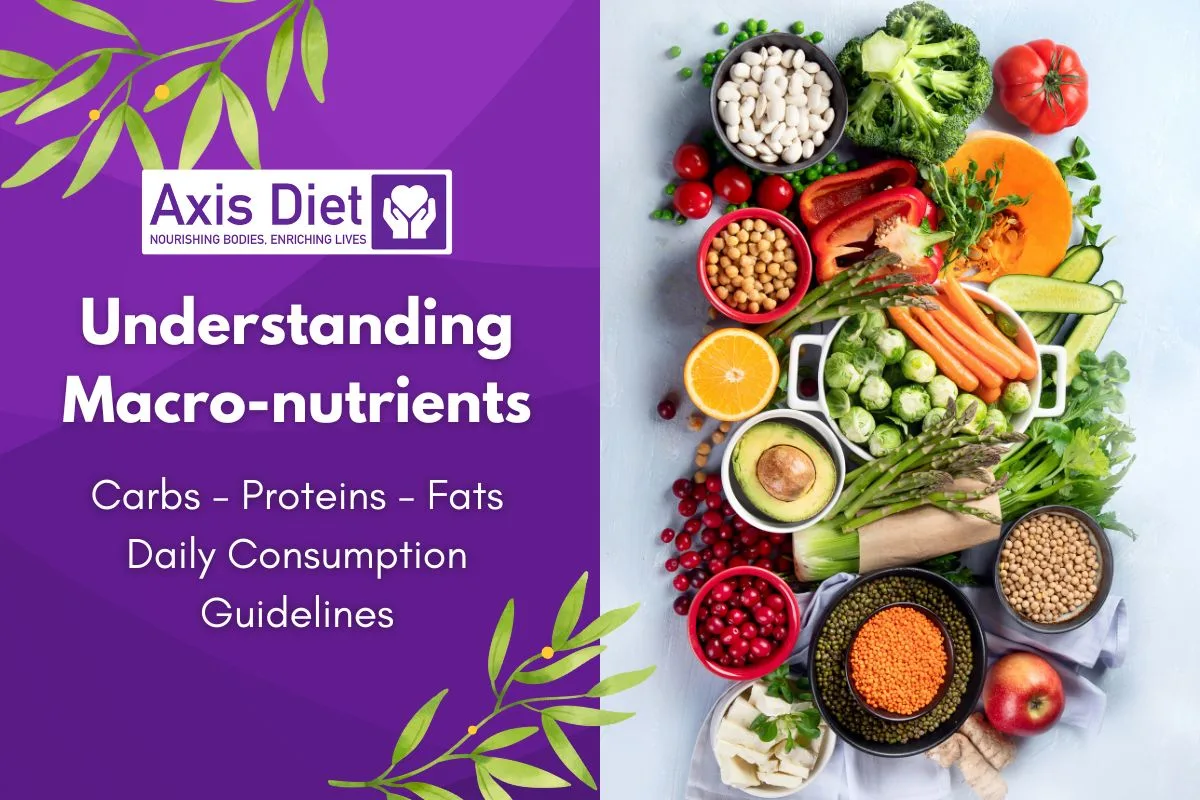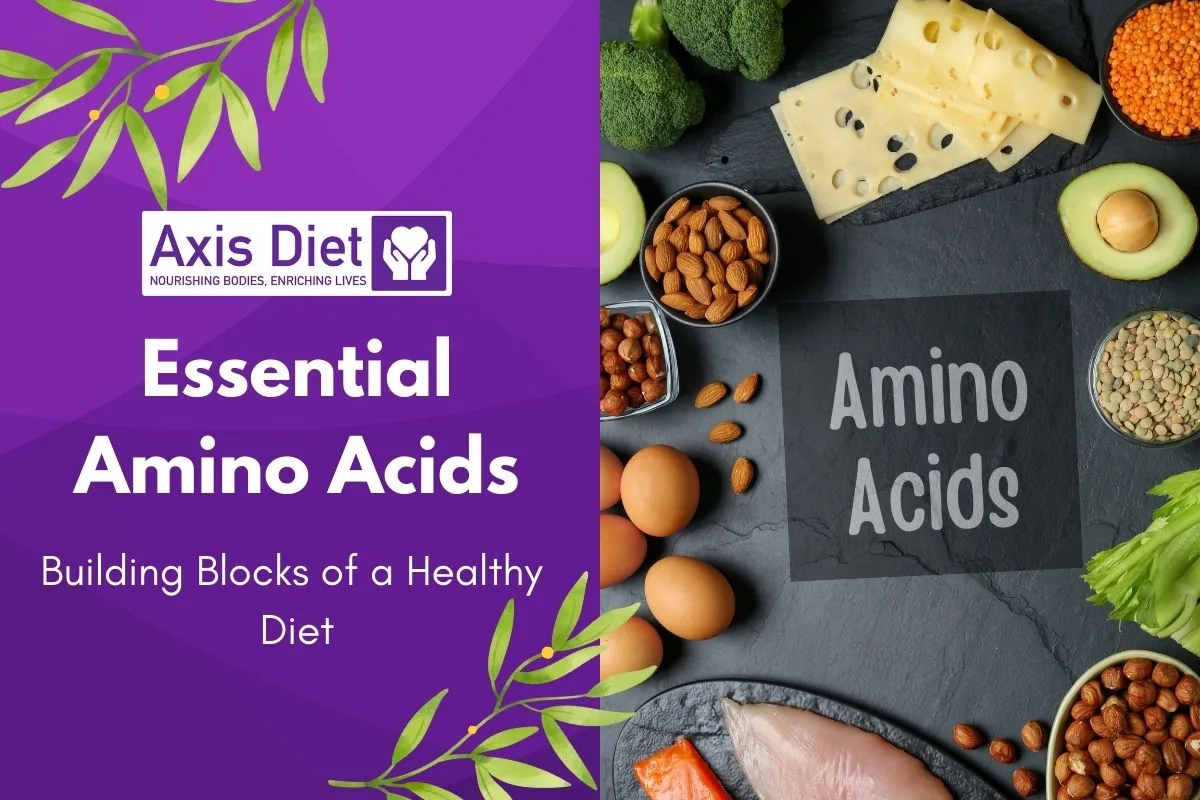Navigating the world of nutrition can be complex, especially when it comes to understanding macronutrients. These nutrients, which include carbohydrates, proteins, and fats, form the foundation of our diet and are essential for energy, growth, and bodily functions. This guide aims to demystify macronutrients, especially in the context of the Indian diet, providing clear guidelines on daily consumption.
What We’ll Cover
Carbohydrates: The Primary Energy Source
Carbohydrates are crucial in providing the energy needed for the body’s various functions, including physical activity and brain operations. They are the most accessible energy source, breaking down into glucose, which fuels our cells, tissues, and organs.
Recommended Daily Intake
The dietary guidelines recommend that carbohydrates should make up about 50-60% of an average adult’s total daily caloric intake. For someone consuming a typical Indian diet of 2000-2500 calories per day, this means that carbohydrates should account for approximately 250-375 grams each day.
Sources in the Indian Diet
In India, carbohydrates are abundant in everyday meals and come from diverse sources:
- Rice: A staple in many Indian households, rice is a quick energy source. Both white and brown rice are popular, but brown rice is preferable due to its higher fiber content and lower glycemic index.
- Wheat: Used extensively in various forms such as chapatis, bread, and other baked goods. Whole wheat products are a healthier choice compared to refined wheat products.
- Oats: Gaining popularity for their health benefits, oats are often consumed as porridge or added to various dishes for added nutrition.
- Maize and Millets: Traditional grains like maize, bajra, and jowar are rich in carbohydrates and fibers. They are often used in rural diets and are slowly being incorporated into urban eating habits for their health benefits.
- Potatoes: A versatile vegetable that is a good source of carbohydrates. It’s important to consume potatoes in moderation and in healthier cooking methods like boiling or baking instead of frying.
- Fruits: Fruits like bananas, mangoes, and apples are good sources of simple sugars and provide quick energy along with essential vitamins and fiber.
Healthier Choices
Choosing the right type of carbohydrates is key to a healthy diet:
- Whole Grains: Whole grains such as brown rice, whole wheat, and millets contain more fiber and nutrients than their refined counterparts. They offer sustained energy release, keeping you full for a longer period and aiding in digestion.
- Fiber-Rich Fruits and Vegetables: These are excellent sources of simple carbohydrates and provide essential nutrients and fibers.
Daily Guidelines
When incorporating carbohydrates into your diet, it’s important to balance simple and complex carbohydrates:
- Complex Carbohydrates: These should form the majority of your carbohydrate intake. They take longer to digest, leading to a slower and more consistent release of energy. Examples include whole grains, legumes, and vegetables.
- Simple Carbohydrates: Found in fruits, honey, and milk. While they provide quick energy, they should be consumed in moderation to avoid spikes in blood sugar levels.
In summary, carbohydrates are an essential part of the Indian diet, providing the primary source of energy for daily activities. By choosing healthier sources and balancing the types of carbohydrates, one can maintain steady energy levels, support overall health, and prevent lifestyle-related diseases.
Proteins: For Growth and Repair
Proteins play a pivotal role in the human body, being fundamental for the repair and growth of tissues, muscle building, and supporting the immune system. They are composed of amino acids, which are often referred to as the building blocks of the body.
Recommended Daily Intake
The general dietary recommendation for protein intake is about 0.8-1 gram of protein per kilogram of body weight. This means, for a person weighing 60 kilograms, the daily protein requirement would range from 48 to 60 grams. This requirement can vary based on factors such as age, activity level, muscle mass, and overall health.
Sources in the Indian Diet
Indian cuisine offers a wide array of protein sources, catering to both non-vegetarians and vegetarians:
- Lentils (Dal): A staple in Indian meals, lentils are a great source of protein, especially for vegetarians. They come in various forms like toor, moong, urad, and masoor, each with its unique taste and nutritional profile.
- Chickpeas and Beans: Chickpeas (chole), kidney beans (rajma), and other beans are not only high in protein but also rich in fiber, making them beneficial for digestion and heart health.
- Milk and Dairy Products: Milk, cheese (paneer), yogurt, and other dairy products are excellent sources of protein and also provide calcium for bone health.
- Eggs: Eggs are considered a complete protein as they contain all nine essential amino acids. They are versatile and can be incorporated into various dishes.
- Poultry and Fish: Chicken, turkey, and fish are excellent sources of lean protein and are easily incorporated into the diet.
Vegetarian Concerns
For vegetarians, it’s important to note that while plant-based proteins are incredibly healthy, they often lack one or more essential amino acids. Therefore, it’s crucial to consume a variety of protein-rich plant foods to ensure a complete amino acid profile. Combining different plant proteins, like rice with lentils or beans with grains, can create a complete protein with all essential amino acids.
Daily Guidelines
To maximize the benefits of protein:
- Distribute Protein Intake: Instead of consuming all your protein in one meal, spread it out over the day. This ensures a steady supply of amino acids to the body and can aid in better digestion and absorption.
- Post-Workout Protein: Consuming protein after exercise can aid in muscle recovery and growth.
- Cooking Methods: Choose healthier cooking methods like grilling, steaming, or baking instead of frying to preserve the protein quality.
In summary, proteins are an essential component of a balanced diet, necessary for bodily repair, muscle maintenance, and immune function. In the Indian context, there is an abundance of protein sources to choose from, making it easy to meet the daily protein requirements through a well-planned diet. For vegetarians, the key is to mix different plant-based protein sources to ensure a complete amino acid profile. By following these guidelines, one can ensure adequate protein intake for a healthy and well-functioning body.
Fats: Vital for Health
Fats, often misunderstood in the diet, are in fact crucial for various bodily functions. They play a key role in hormone production, aid in the absorption of fat-soluble vitamins (A, D, E, and K), and provide a cushion to protect vital organs. Moreover, fats are an important source of energy.
Recommended Daily Intake
Dietary guidelines suggest that fats should make up about 20-30% of the total daily caloric intake. For an individual following a standard 2000 calorie diet, this means that fat intake should be in the range of 44-66 grams per day. It’s important to note that fats are calorie-dense, with 1 gram of fat providing 9 calories, more than double that of carbohydrates or proteins.
Sources in the Indian Diet
The Indian diet offers a variety of sources for healthy fats:
- Ghee and Butter: Commonly used in Indian cooking, ghee and butter are sources of saturated fats. While they can be part of a healthy diet, moderation is key due to their high saturated fat content.
- Oils: Different regions in India use different types of oils. Mustard oil, coconut oil, and sunflower oil are widely used. Each oil has its unique nutritional profile and should be used judiciously.
- Nuts and Seeds: Almonds, walnuts, flaxseeds, and chia seeds are not only rich in healthy fats but also contain protein, fiber, and various essential nutrients.
- Fatty Fish: Fish like mackerel, sardines, and salmon are excellent sources of omega-3 fatty acids, beneficial for heart health.
Types of Fats
Understanding the different types of fats is important for making healthy choices:
- Unsaturated Fats: These are considered heart-healthy fats. They are predominantly found in plant sources like nuts, seeds, and certain oils, as well as in fatty fish. Unsaturated fats are beneficial for heart health and can help reduce inflammation.
- Saturated Fats: Commonly found in animal products and some tropical oils. While they can be part of a balanced diet, excessive consumption of saturated fats has been linked to an increased risk of heart disease.
- Trans Fats: These are found in processed and fried foods and are known to be harmful to heart health. It is advisable to minimize or avoid trans fats.
Daily Guidelines
When incorporating fats into your diet, consider the following:
- Cooking Oils: Use cooking oils like mustard, coconut, or sunflower oil sparingly. Opt for cooking methods that require less oil, such as grilling, baking, or steaming.
- Nuts and Seeds: Include a small portion of nuts and seeds in your daily diet. They are nutrient-dense and can be added to salads, yogurt, or eaten as snacks.
- Balanced Approach: Aim for a balance of different types of fats in your diet to ensure you get the full spectrum of benefits without overconsumption of any one type.
In conclusion, fats are an essential part of a balanced diet, contributing to vital bodily functions and overall health. By choosing the right types of fats in appropriate quantities and incorporating a variety of sources, one can effectively manage fat intake to support a healthy lifestyle in the context of the Indian diet.
Balancing Macronutrients in the Indian Diet
Achieving a balanced diet is crucial for maintaining good health, and this balance is primarily about getting the right proportions of macronutrients – carbohydrates, proteins, and fats. The “Indian RDA Revised 2023” provides a framework for what constitutes a balanced diet for an average adult, but it’s essential to tailor these recommendations to individual needs.
Adapting to Individual Requirements
The standard ratios provided in dietary guidelines serve as a general template. However, individual requirements can vary significantly based on several factors:
- Age and Gender: Different life stages and gender-specific needs can influence macronutrient requirements. For instance, pregnant or lactating women may need more of certain nutrients.
- Activity Levels: Active individuals or athletes may require more proteins and carbohydrates for energy and muscle repair.
- Health Goals: Weight loss, muscle gain, or managing certain health conditions like diabetes or heart disease can necessitate adjustments in macronutrient ratios.
Practical Tips for Balancing Macronutrients
- Portion Control: Learning to gauge portion sizes can help manage macronutrient intake without the need for constant calorie counting.
- Food Diaries: Keeping a record of daily food intake can be an eye-opener and help in making necessary dietary adjustments.
- Diverse Food Choices: Including a variety of foods in your diet ensures a broader spectrum of nutrients. For example, combining different types of grains, vegetables, fruits, dairy, and protein sources can provide a more balanced nutrient profile.
Common Myths and Misconceptions
- Carbohydrates: Not all carbohydrates are detrimental to health. The focus should be on complex carbohydrates with low glycemic indices, like whole grains, rather than simple sugars.
- Fats: Fats are often unfairly demonized. While it’s important to limit unhealthy trans fats and saturated fats, healthy fats from sources like nuts, seeds, and fish are essential for the body.
- Proteins: There is a misconception that high protein diets are only for athletes or bodybuilders. In reality, proteins are vital for everyone for bodily repair and maintenance.
Conclusion
Balancing macronutrients is not about rigid dietary rules but about understanding the role and importance of each macronutrient and making informed food choices. A diet that includes a variety of food groups, considers individual lifestyle and health goals, and dispels common myths about macronutrients is key to a healthy life. This approach to diet and nutrition can help individuals not only in meeting their daily nutritional requirements but also in achieving their long-term health and wellness goals.






[…] of the most important components of a weight loss diet is protein. This macronutrient is essential for muscle maintenance and repair, especially as muscle mass tends to decline with […]
[…] For more insight into how macronutrients affect your diet, you can explore understanding macronutrients. […]
[…] well-balanced 1200 calorie Indian diet plan should include all the essential macronutrients – carbohydrates, proteins, and fats – in the right proportions, along with an adequate […]